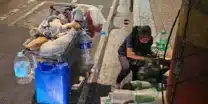Editor’s Note: The following story contains details which may offend sensibilities. This is not to glorify or justify the actions of the protagonists.This is an attempt to call the attention of the government and the society on this social media phenomenon.

WOMEN who were arrested by agents of the Philippine National Police (PNP) and National Bureau of Investigation (NBI) said poverty drove mothers to sell their own children online.
“Parents sell their children, these pornographic materials, for monetary gain, “ Brig. Gen. Arcadio Jamora, chief of the PNP Women Children Protection Center (PNP-WCPC) said. “That’s the very reason, actually. I wonder why there are a lot of women like that. Of course, this new system is more online, especially during pandemic, transaction is more online.’’
The International Justice Mission (IJM), a faith-based non-profit organization in Virginia, USA, said “more research is needed to understand how and why” a mother pimps sell their children’s souls online.

Cynthia (not her real name), who was arrested last month in a sting operation in Taguig, also said she was forced by poverty to sell her children online.
“Naniwala rin po ako sa sinabi ng customer ko pakakasalan nya anak ko,” she said in between sobs. She was referring to her daughter, who is just 10 years old.
PNP investigators told republicasia that a cursory look at the lifestyle of mother traffickers show they are not “dirt poor.”
In the case of Cynthia, aside from tablets and smartphones seized inside her home, agents also confiscated three sachets of meth powder (shabu). A sachet of shabu costs P10,000 at the black market.
When asked about the drugs seized from her house, Cynthia simply shrugged it off, “Minsan lang naman.”

Police said drugs create two effects on mother pimps – one is that these propelled them to be bolder or aggressive in doing illicit activities even to a point of compromising their children’s safety. Second is that online sexual abuse also “sustains” their lifestyle of access to drugs and gives them a certain degree of financial freedom.
“We don’t know yet whether the drugs were the cause or just one of the consequences for mothers to pimp their own children online,” the investigator told republicasia.
It takes a village to raise a child
The lure of “easy money” not only applies to a single cell of a family. The entire community may be behind it.
Based on the 2020 study of IJM, 54 percent of online sex traffiicking involves not just the mother. It also involves three or more people – often family members too from their own community.

“For example, one person may communicate with the customer while the other oversees or commits the sexual abuse or collects the money for the abuse,” the IJM wrote.
A police investigator said that sometimes neighbors wonder about a family which has suddenly become “richer,” curious about how they were able to support the lifestyle of having high-end gadgets and of being able to buy new clothes and food.
“Pag nalaman nila na ahhh ganun pala. Ok lang naman kasi di no-touch naman. Mamaya, mga kamag-anak na, mga kapitbahay na, kasama na sa negosyo,” the investigator said.

In the case of Cynthia, her network has sprung to her neighborhood through another scheme – recruitment.
The investigator said Cynthia’s children confessed that they were asked to go to their playmates and convince them to take nude photos of themselves.
“Sabi ng mga customer kay Cynthia, wala na bang iba? Kaya ayun, sinabihan niya mga anak nya, punta sila sa kapitbahay kausapin mga pinsan, mga kalaro. Una, modeling, modeling muna. Mamaya, tanggal na ng damit. Para matahimik, binibigyan na lang ng pera, ng chocolates. Huwag lang magsumbong o magkwento sa mga magulang,” the investigator added.
Thus, when the NBI swooped down on Cynthia’s shack last September, another NBI team conducted a simultaneous raid in another house next to hers and rescued three children – playmates and cousins of Cynthia’s children.
Children who survived online sexual abuse by their own family and community experience “more complicated trauma” compared to children who were abused by people not known to them, the ICM said.

And with the involvement of family in the cycle of abuse, this creates “unique challenges for survivor aftercare.”
“When family members are directly involved in the abuse, Social Services often has fewer options for placing the survivor in care because family-based care may be unsafe. Furthermore, if the parents are arrested, there may be additional children beyond the survivor (e.g., brothers and sisters who were not abused) that also have to be placed in new homes,” the IJM said.
While the world is still battling their own challenges brought by the pandemic, another epidemic of sorts is created – a community of online abusers, abetted by their own family. Law enforcement units are catching up, making arrests in unprecedented coordination efforts worldwide. But as soon as the arrests are made, another ping would pup up, with children abused online, pimped by their very own mothers who are supposed to protect them.







